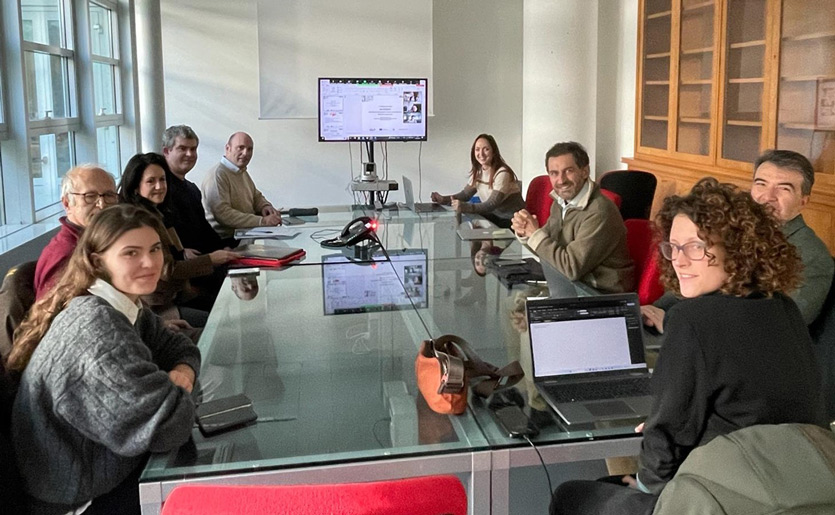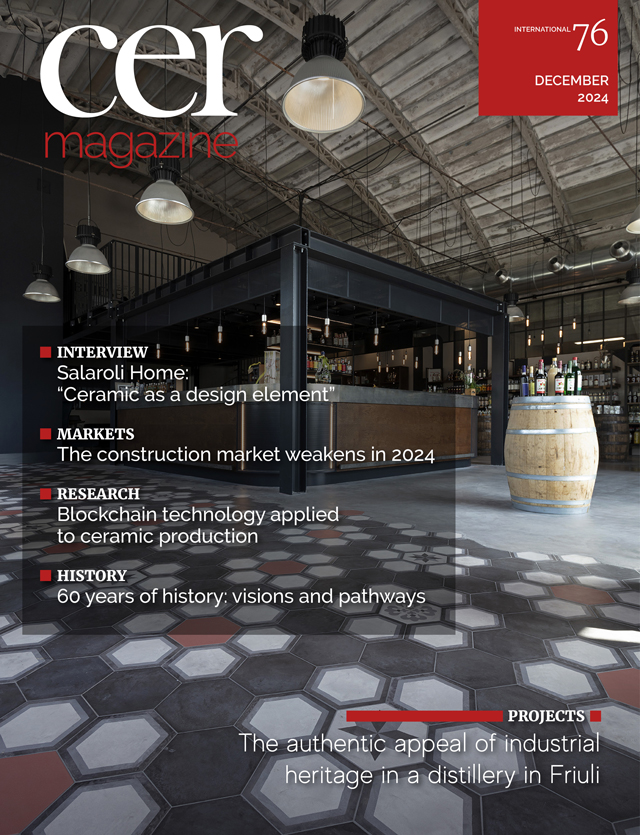Blockchain technology applied to ceramic production
(December 2024) | As a strategic tool for economic development and social innovation, digital transformation is the cornerstone of Europe’s Digital Decade policy programme, a comprehensive framework that sets goals and targets for 2030 with a view to promoting the progressive digitalisation of citizens, businesses and public administrations. One of the most important emerging digital technologies in this context is blockchain, a decentralised, distributed virtual ledger that allows data to be shared, stored chronologically and verified by users without the need for an intermediary. Blockchain technology’s core attributes of traceability, transparency and immutability are enhanced by the use of cryptographic techniques to facilitate the secure transfer and validation of data. Blockchain technology is already widely used in the financial services sector for creating and managing cryptocurrencies and is now also being adopted in the healthcare sector to create digital crypto wallets for individual citizens. The next frontier is its application to the building and construction sector.
 As part of its Smart Specialisation Strategy (S3), the Emilia-Romagna Region (RER) has recently launched a number of European co-funded projects aimed at fostering collaboration between research laboratories, university technopoles and businesses and promoting industry-wide innovation in terms of digitalisation, artificial intelligence and big data (businesses and public administrations). One such project, entitled Blockchain technology for ceramic and construction materials supply chain [BLOCH4MAT], aims to develop and build a blockchain platform that can be applied to the supply chains for ceramic tiles, structural clay products and composite materials, all of which are considered strategically important building materials for the region’s economy. The goal of the project is to make product-related information content traceable, secure, unambiguous and non-falsifiable throughout the entire product life cycle. Information relating to raw materials, factory processing, certifications, finished product construction and disposal can be managed via blockchain while maintaining a high degree of data confidentiality. The technology will also be integrated with BIM (Building Information Modelling) and/or other digitalisation processes such as digital CE marking (SmartCE).
As part of its Smart Specialisation Strategy (S3), the Emilia-Romagna Region (RER) has recently launched a number of European co-funded projects aimed at fostering collaboration between research laboratories, university technopoles and businesses and promoting industry-wide innovation in terms of digitalisation, artificial intelligence and big data (businesses and public administrations). One such project, entitled Blockchain technology for ceramic and construction materials supply chain [BLOCH4MAT], aims to develop and build a blockchain platform that can be applied to the supply chains for ceramic tiles, structural clay products and composite materials, all of which are considered strategically important building materials for the region’s economy. The goal of the project is to make product-related information content traceable, secure, unambiguous and non-falsifiable throughout the entire product life cycle. Information relating to raw materials, factory processing, certifications, finished product construction and disposal can be managed via blockchain while maintaining a high degree of data confidentiality. The technology will also be integrated with BIM (Building Information Modelling) and/or other digitalisation processes such as digital CE marking (SmartCE).
BLOCH4MAT, financed by the Emilia-Romagna Region under the European Regional Development Fund (ERDF) Programme 2021-2027, is coordinated by Centro Ceramico and involves partnerships with CIRI EC (Interdepartmental Industrial Research Department for Building and Construction) of the University of Bologna, the University of Ferrara TekneHub (research laboratories affiliated to the Advanced Technology Network) and Consorzio Futuro in Ricerca (CFR) for technology transfer and dissemination. In collaboration with the companies Tonalite, Sacmi and Wienerberger, Centro Ceramico will oversee the information acquisition and analysis activities relating to the design of a blockchain model for application to ceramic supply chains (ceramic tiles and structural clay products). CIRI EC will apply blockchain technology to composite materials in collaboration with Ardea Ingegneria, while TekneHub will contribute its expertise to the application of advanced digital modelling protocols through collaboration with the Innovation Chain start-up.
Since the agreement with the Emilia-Romagna Region was signed on 15 February 2024, project activities have begun and are divided into 6 operational steps with a total duration of 24 months. Flows and critical points in the supply chains of ceramic tiles, structural clay products and composite materials are currently being identified in collaboration with project partner companies. Over the coming months, the project will focus on the central activity of modelling the blockchain to each supply chain and its subsequent implementation on an IT platform. This will be followed by validation of the model using company case studies for each type of building material and integration with the product-specific BIM object.
BLOCH4MAT is aimed at the construction industry, a sector in which the process of digitalisation is hampered by the industry’s inherent complexity, stringent regulations and the substantial investments required for the digital transition compared to the anticipated returns. Using blockchain in the building materials supply chain can bring real benefits in terms of transparency of information and interoperability between the supply chain actors who are required to share and use it. The project is expected to deliver benefits in terms of production optimisation, improved efficiency of supply chain management and operational flows, and reliability of the product-related information package. In a broader perspective, blockchain-based digitalisation is capable of boosting the Italian industry’s competitiveness, especially in relation to exports, which in the case of the Italian ceramic tile industry account for more than 83% of revenues.
Authors:
Valeria La Torre and Maria Chiara Bignozzi, Centro Ceramico – Sassuolo (MO)
Alessandro Bellini and Marco Savoia , CIRI EC, Centro Interdipartimentale per la Ricerca Industriale Edilizia e Costruzioni, Università di Bologna
Fabiana Raco and Marcello Balzani, TEKNEHUB, Tecnopolo di Ferrara






